Note
Hey lovely, can you please recommend google chrome extensions, specifically for note taking.
Hello! I actually haven’t used any chrome extensions for note taking. I mainly used the blocking extensions. I performed a search and found a few but as I haven’t used them I can’t speak for their quality:
Knotes : “Knotes is a beautiful and simple note taking app for Chrome from the makers of Knotable. Now you can keep all of your thoughts in one easy to access place both online and off! Once you can sync your knotes, you can view them in Knotable, Dropbox, or Gmail.”
Beanote : “This small tool helps you to take notes on web page. ”
95 notes
·
View notes
Note
hi! I was wondering if you have any tips for someone who isn't good with self-discipline. I have a problem with not exactly lack of motivation because I know why I want to get better at stuff, I want to do it but I just can't keep it up for longer than few days (this is at my best time). I've always had a problem to just keep going on. The progress is always almost invisible and I keep seeing people that are way better at the thing than me and it never helps. Thank you and have a good day!
Hello! This seems like a good article on developing self-discipline. I hope it helps! Have a great day!
95 notes
·
View notes
Note
I am sorry for disturbing, but I am wondering where I can find your tips on "how to make flash cards". I would really appreciate it 😄
Here are some flashcard posts that might interest you:
Making & using flashcards:
My guide to making flashcards
Quick visual guide to using flashcards
Some quick tips for using flashcards
Inspiration etc:
Generic flashcard tag (all posts, especially pics)
The set of flashcards that I preferred to buy and use
Some of my old flashcards; 1 - 2
Flashcards (by studywithstyle)
Flashcards (by avhoche)
Flashcards (by sabitcher)
Flashcards (by skyestudies)
Flashcards (by reviseordie)
159 notes
·
View notes
Photo

Tips for Studying With a Computer
Why use a computer? Is it useful for me?
I suffer from attention problems and learning disabilities. Writing things on paper is not suitable for my thought process. Rather, I jump around and write different things at a time, then continue a previous thought process. On paper, this might involve a lot of erasing, re-writing, and arrows, and I end up with a very difficult-to-navigate mess. Typing it out allows me to write out my thoughts while maintaining a sense of coherency.
It’s very fast once you get going. With a good typing speed, knowledge of keyboard shortcuts, and a relatively fast computer, it’s a lot faster and easier to format than writing things down.
As a very visual/artistic person, I spend a lot of time trying to make my notes and handwriting neat. I also can spend a lot of time drawing diagrams, especially studying biology. On a computer, I can easily create tables and copy and paste diagrams (or sometimes create diagrams) with little effort.
These are just my personal reasons, and if you can relate, I highly suggest trying to use a computer. It’s important to have proficiency in computers, so you can Google tutorials, take a class, or ask around. This guide assumes you have reasonable proficiency in computers.
Resources
Download your textbooks.
Note-Taking
OneNote is my program of choice due to its versatility and automatic syncing across many devices. Here is my post on using OneNote for university.
Evernote is also a great note-taking program and comes with a built-in document scanner camera which I frequently use.
OpenOffice is a free alternative writing program very similar to Microsoft Office.
Notability
Notepad++ (for coding)
Organization & Time Management
Google Calendar / Google Keep
iCalendar
Habitica
Plan
Todoist
Lanes
Study & Projects
Anki
Quizlet
paint.NET
Prezi
Audacity
Mind Maps
Bubbl.us
XMind
Freemind
Research
Bibme
Google Scholar
Research notes: If your university/institution offers a paid research citation program for free (Mendeley, Refworks, EndNote, etc.), use it. Otherwise you can use a spreadsheet program like Excel.
Take advantage of study playlists / ambient sounds.
Use online resources.
Your teacher may discourage against Wikipedia, but use it to gain a broad overview of a topic you may be unfamiliar about and check its sources when doing research.
Google topics. Don’t use them as sources, but they’re great when you have a quick question. Google can also function as a calculator.
General
Khan Academy
Crash Course
Learn a new skill
Educational YouTube channels
Science
Free science books
Dynamic Periodic Table
ChemWiki
Coding websites
@study-well: Biology / Chemistry
Math
Wolframalpha
Symbolab
Math is Fun
Undergraduate Mathematics
Productivity
Learn keyboard shortcuts. If you’re going to be typing a lot, you can save yourself a lot of time by memorizing certain keyboard shortcuts.
The very basics you should learn is Ctrl+C / Cmd+C for copy, Ctrl+V / Cmd+V for paste, Ctrl+X / Cmd+X for cut, and Ctrl+A / Cmd + A for selecting all text.
In browsers, Ctrl+W / Cmd+W closes a tab, Ctrl+T / Cmd+T opens a new tab, Ctrl+Shift+T opens a previously closed tab.
In Windows, Alt+F4 closes a program and Alt+Tab switches through your open tabs.
In many text-editing programs Ctrl+B / Cmd+B is to bold text, Ctrl+I / Cmd+I is to italicize text, Ctrl+U / Cmd+U is to underline text, Ctrl+- is to strikethrough text, Ctrl+Shift++ superscripts text, and Ctrl++ subscripts text.
Look it up in your program/OS, as each has its own set of keyboard shortcuts.
Google efficiently. Here is an article about Google tips for students.
Sync across multiple devices. Use software that is available online and across multiple platforms to sync files on your laptop, on your phone, and online.
Symbols can be tedious to copy-and-paste if they cannot be typed on a keyboard. If you have a numpad, on Windows you can memorize certain codes to quickly type symbols. On Word, under Insert > Symbols, you can find symbols and recently-used symbols to insert.
However, I suggest in work that requires a lot of symbols (mathematics and physics, chemistry, computer science, etc.) handwriting in this case is the superior option.
Use a drawing tablet (personally, I use Wacom and it has lasted me years) or a tablet with a pen such as the Apple Pencil or Microsoft Surface to handwrite notes in programs and back them up automatically. Of course, these require money and it’s up to you if it’s worth the investment.
Limit yourself to certain symbols based on what your keyboard provides for you.
Instead of an arrow symbol, I use a dash and a less than or greater than symbol like -> or <-.
Instead of a degrees symbol, I use a superscript o.
Write a placeholder for symbols (such as (d) for delta) and replace with symbols after taking notes.
Write out your notes and type them out later when you have time, ensuring you write down symbols.
Cut the distractions. The biggest fault I find when using a computer for school is the endless possibility for distraction.
Create an alternate account on your computer that doesn’t have administrator privileges purely for study. This can limit your access on the computer and hopefully to distracting programs.
StayFocusd on Chrome to block distracting websites after a certain allowed time. (Protip: enable it in incognito mode and block “chrome://extensions” to prevent temptation to circumvent it.)
Cold Turkey (PC) / Self-Control (Mac) to block distracting programs and websites.
Ommwriter for writing in a distraction-free interface.
10 Websites to Stop That Will Help You Stop Procrastinating For Good
Health
Do not stare at the screen for too long and right before bedtime. Computer screens disrupt your sleeping cycles. Turn off your computer 1 - 2 hours before you go to sleep.
Change your writing program background to a pale colour, rather than white.
Use f.lux, which changes the blue-light of your computer screen to orange light.
Stop staring at your screen and take a break from it.
Suffering from Carpal tunnel? Look at these exercises.
Maintain your computer’s health.
Keep it on hard, flat surfaces as much as possible and avoid keeping it on your bed for proper ventilation. Try to turn it off every night.
Security-wise, ensure your data is backed up, encrypt your sensitive data, keep your passwords strong, and ensure you have an antivirus and firewall. + more basic security tips
My rule of thumb is that when my computer runs into a problem, it is more likely I will break my computer further by trying to fix it. Unless you absolutely know what you’re doing, take it to get repaired, whether at a Best Buy/GeekSquad, Apple/Genius Bar, computer mechanic, etc. Do not touch it and save yourself some grief.
Back up your files! I cannot stress enough the importance of backing up notes and assignments on a regular basis. It’s safe to use at least two or three methods of backup to ensure you won’t lost your files.
Email attachments to yourself. Depending on your storage space for your email, this could be very useful. Main advantages include it being very easy, universal, and the ability to sort versions of a document by data.
Use online services such as MediaFire. Mediafire comes with 10 GB free.
Sync your files.
Use Dropbox. You start with 2 GB and can earn more space on a free account, which is plenty for me for a semester of work. Dropbox syncs files across multiple devices. This works for most students aside for those working with large files, such as media studies.
Use Google Drive. Google Drive comes with 15 GB space free, which makes it more advantageous than Dropbox for free users. Furthermore, it comes with browser built-in text editor/spreadsheet tool/presentation tool that you can collaborate with others on. It’s a very useful tool for group projects.
Use OneDrive. You get 5 GB free and comes with every Microsoft Office copy.
Use physical means.
A USB key is very handy and portable, if easy to lose. I suggest tying it to a lanyard or attaching it with your keys. Put your name on it and email in case someone finds it.
Use a portable hard drive.
8K notes
·
View notes
Photo

Ok so I’ve finally gotten around to doing this highly requested post based off this post and I’m sorry to all those who had been waiting for ages for it to come out but here it is!!!
How to Annotate a Novel Efficiently
Look I’m actually doing the play Medea at the moment so this can be used for other texts apart from novels too!
Like I’ve said before, I know lots of people don’t want to taint their texts with writing and highlighting, but to me, it is so so satisfying when I finish with a fully annotated book with tabs flying out of every page and all that, plus it acts as a sweet resource once it’s done.
((Hopefully by the time you’ve gotten around to this level of annotating, you’ve read through your text already and maybe even put down some initial thoughts in the margins.))
To put it simply, I have three levels of coordination when it comes to annotating a novel: words, tabs and sticky notes.
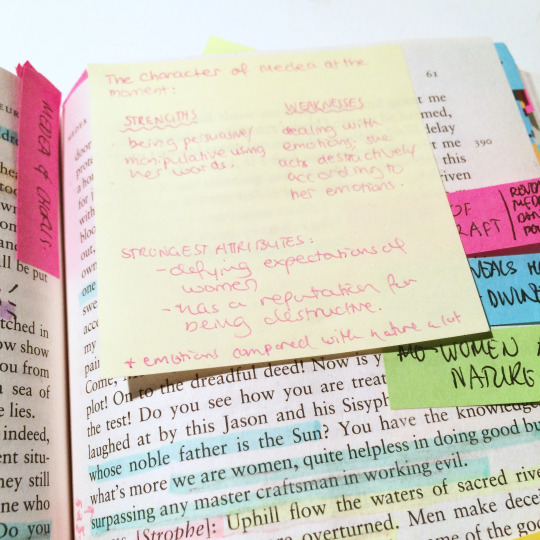
1. Sticky notes
Use for big chunks of text you can’t fit in the margins of your book, such as summaries of characters, themes, etc
They can also get those big chunks of info to stand out from the rest of the novel
If you’re reading a larger text with chapters, it’s quite handy to use big sticky notes to summarise each section.
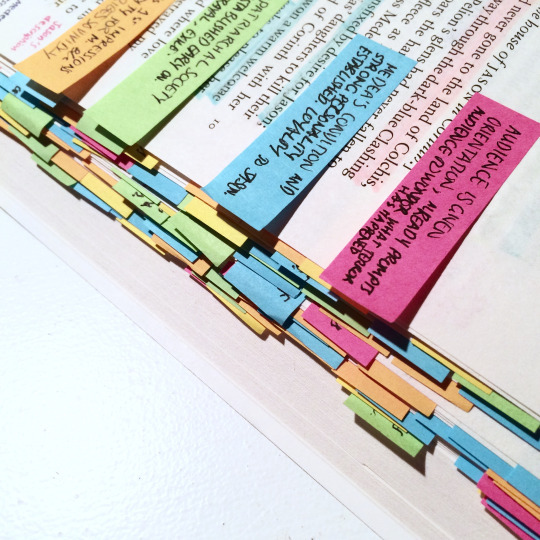
2. Tabs (and highlighting)
Yep so these are the tabs I have sticking out of my book and they’re used for quick references, where I can easily search up a type of quote quickly in the novel without having to flip through every page.
The colours of the tabs I use are the same colours as my highlighters, so it is easy to see where the quote is and which tab it corresponds to.
ACTUALLY HIGHLIGHT the specific quote rather than leaving a tab there by itself, for future reference when you need a specific quote, but if you’ve got a massive chunk that is just too important to pick out a small quote, use a square bracket on the inside margin. Smaller quotes are better.
Have a tab for broad topics such as characters, themes, literary devices, plot developments, context, etc. If you have more colours, you can always make your categories more specific (for me, the character of Medea is separate to the rest of the characters)
I write the main idea on the tab itself, a.k.a. the reason why I highlighted or tabbed that quote there.
Which quotes to highlight depends on
a) What we go through in class
b) What is written as an important quote in the text guide we are given/the internet suggests
c) What I think is important. If you’re not sure, ask yourself WHY is that quote important and if you can answer that, highlight it!!!

3. Words
The further explanation of quotes is written on the actual pages, and often right under a tab to elaborate.
I recommend using a thin pen as in 0.38 to really fit in as much as possible.
This step as well as tabbing is so so important, because you can highlight as much as you want, but it really won’t mean anything until you’ve written down its significance, and even if you have an amazing memory, this is vital ok. Even a few words along the margin explaining the quote can mean the difference between good writing and great writing in your upcoming essay.
What do I actually write? If it’s a literary device, I’ll name it (e.g. Metaphor) and explain its symbolism, or the author’s intention for putting that in. If it’s a theme related quote, I’ll explain the message that the author is trying to convey through that quote. If it’s a character related quote, I’ll explain how that quote adds to their character, maybe finding contrasts, etc.
Supplies that I used were:
- Mildliners (pink, orange, yellow, blue, aqua; gotta get that colour coding)
- Pilot Frixion Point
- Uni-ball Signo TSI (erasable like the frixion pen so that if I’m not too sure about what I’ve written as an annotation, I can check with the teacher and erase if need be)
- A set of 1000 tabs in total, divided among pink, orange, yellow, green and blue
- Pastel square sticky notes
As an optional step, I highly recommend making use of the back cover or spare pages in the book. I use them for writing definitions of recurring words, good vocabulary to use in the future when writing the essay and also character maps, explaining the relationship between each character.
I hope you all find this helpful!
((disclaimer: this is just how I do it so don’t shank me pls))
Kate xx
13K notes
·
View notes
Text
Foolproof Guide to School Success!

Hi! I just finished my first year of college and I definitely have to credit the studyblr community for all the useful information and tips! I currently closed the year with a 4.0 and don’t plan on stopping!
In high school I was an ok student but I decided to change all that when I started college. So, whether you’re in high school or college, it’s never late to change and attain academic excellence! So here are my tips!
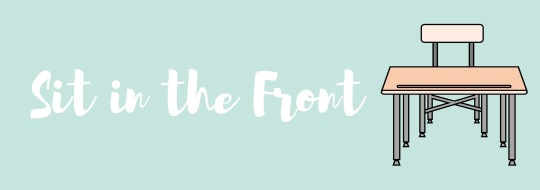
Try to get an early start on your day and sit closest to the front as possible. Studies show that sitting in the front of class will improve your grades and knowledge!
A study showed that those who sat in the front achieved an average of 80% while those in the middle achieved an average of 71.6% on their exams. And guess who did even worse.. unfortunately those in the back scored an average of 68.1%
Distractions are decreased because there’s no one sitting in front of you, just the lecture which basically forces you to pay attention.
This increases the likelihood of your professor getting to know you. Why is that important? Well, in an accounting course I once took, I sat in the front, attended extra tutoring sessions hosted by that instructor, and generally put in extra effort in the class. By the end of the semester everyone was really struggling, over 20 students flunked out, and even my tips weren’t getting me to that A I wanted. Well, because I had established who I was and that I was serious about the class, my instructor bumped my final course grade from an 88% to 93%! She said she noticed the effort I put in so she gave me the grade she thought I deserved
Seriously, sit in the front!!

Ok, now that you have a good spot in the class, make sure you take great notes! The Cornell notes system is great but do whatever works best for you.
Abbreviate often
Date your notes at the top so you can order them chronologically. This will make studying a breeze later on.
Find a color coding system that works for you. Highlight main ideas and vocab.
Find a notebook that works for you. I was lucky enough to score 20 moleskines at my local thrift store at 1 dollar a piece so I’ve been using those.
If you prefer loose leaf paper, buy a bunch and stick it into a flexible binder so you can organize and reorganize your paper.
Use post-its and sticky tabs to add extra info that you might have left out during class. Use sticky tabs to find certain notes faster.
These are some of my favorite note taking supplies:
These Pilot G-Tec pens are some of my favorite pens ever! They are super smooth and the lines are really fine. This 5 pack costs around $11 which is pretty affordable!
Mead notebooks are a classic staple. Seriously these are super durable!
These sticky post-it tab hybrids work really well for marking a page and highlighting important info.
Mildliners are really nice and the colors are not to bright. A pack runs around $7 and a 3 pack is $15 on Amazon.
If you want to go the extra mile, retyping up your notes is a great idea. That way your in class notes can be messy and it won’t matter since you’re going to type them up anyway. One Note is awesome for notes.

I developed my own system for deciding on how I will study and how often I will study. It goes something like this:
Rank your classes in order of difficulty into three sections:
Easy, medium, and hard….
Easy classes get one point
Medium classes get two points
Hard classes get three points
Is the class math related? ….. add 2 points
Is it science related? …… add 2 points
Is the class a subject that you struggle with? ….. add 3 points
is the class AP? ……… 3 points
Add up the points for each class.
Classes with 1-3 points:
these classes are generally easy and have an easy instructor, contain info you already know, etc.
These classes get 45 minutes a day in your schedule and minimal studying on weekends.
Classes with 4-8 points:
These classes might need some more effort so try to…
Set aside an hour a day and 30 minutes on weekends.
Classes with 9 points and up:
These classes are usually more intense, have daily assignments, have a strict instructor, etc.
Set 2 hours a day and an hour or more on weekends. Consider going to free tutoring provided by your school, join a study group, or go to your instructor’s office hours.

Plan your months, weeks, and days in advance! Keep a planner, calendar, or bullet journal. I personally use a bullet journal and keep a calendar printable in each binder I have for my classes.
Include due dates, exam dates, when your rentals are due, etc.
Look at it everyday!!! That way you won’t forget important events.
If you want to, make it pretty! Decorate it with stickers, pictures, polaroids, etc. to make it more personal.
If you prefer minimalism, keep a simple planner or bullet journal system.
If an electronic system works better for you, go for it! But I’ve noticed that writing it on paper works best!
Here are some great planners or journals to use:
Moleskines are always a great choice!
This hardcover Yoobi journal is comparable to the Moleskine and comes in pretty colors! The price is awesome, each one runs at $6!
Bando makes super pretty and trendy planners. They run from $20 and can get pricey though. It’s definitely worth it though!
This Sugar Paper gold polka dot planner is really cute and super affordable!
The AT-A-GLANCE planner has a monthly view and daily sections with plenty of room for writing in important dates and decorating with cute stuff!
Kikki K has amazing planners. If you want to splurge consider their stuff. I’ve always wanted one but it’s around the price of a textbook :(

While Studyblr has so many resources and tips, in case you haven’t noticed, a lot of the pretty pictures use muji pens, staedtler fineliners, and those cute lil’ backpacks. Remember that you have to use supplies that work with you. Here are the essentials to carry with you:
Notebooks and binders
A sturdy and comfy backpack. I use the Borealis backpack by The North Face on discount. Make sure it has comfortable straps, back support, enough room for all your stuff, and compartments for your food and water bottle.
A phone charger. Keep it in your backpack. My phone has died on me so many times and it sucks, especially if you have to take the bus. Invest in a portable charger.
Earbuds are a must, especially if you take public transportation. Also great for when you’re at the library, gym, etc.
As previously mentioned, a water bottle and FOOD! Pack a lunch but also have backup snacks like granola bars or nuts. You need food and water for energy.
Keep extra change. You never know when you need it!!
Your planner.
Pens, pencils, etc. Especially a stapler if you have homework that you regularly turn in!! Its really awk when someone doesn’t have a stapler and everyone in the class doesn’t either..
A laptop, seriously a must! Chromebooks are affordable!
Hope that’s helpful! Looking forward to another year in college and staying in the Studyblr community,
Thania
15K notes
·
View notes
Photo
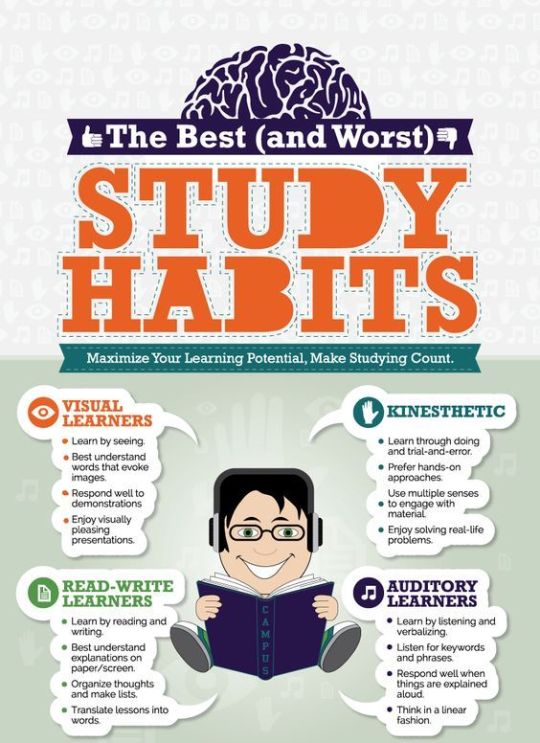

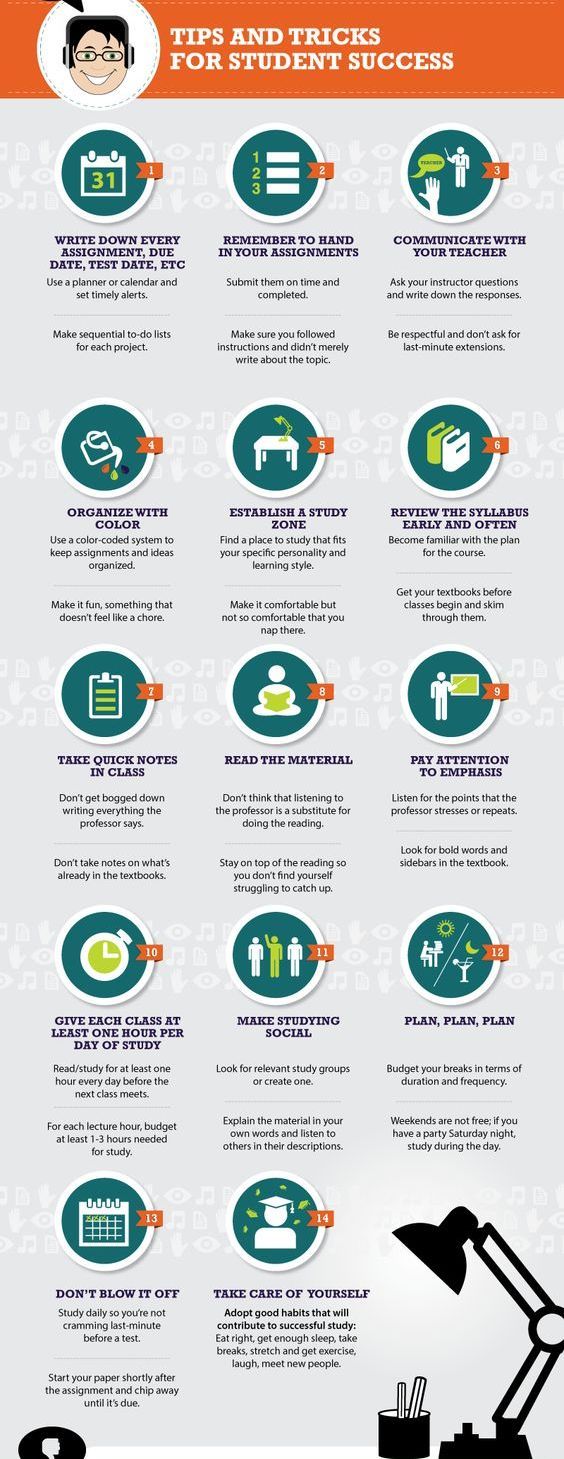

guys, i found these tips to be useful and thought of sharing it on studyblr.
ps: i do not own any of these images
3K notes
·
View notes
Text
How to deal with a concept you do not understand
Breathe. If you are starting to feel flustered, stressed, frustrated, take a break. The more angsty you feel, the less likely you’ll be able to focus on the actual concept. Take a break, study something else, but make sure when you’re trying to tackle a difficult concept, you are calm, cool, and collected.
Re-read your notes. This one is obvious but ask yourself if you’re actually re-reading your notes or if you’re just glancing over the page. Sometimes it helps to rewrite your notes in a different way.
Read someone’s else’s notes. Sometimes reading something in a different way can help you understand a concept you are struggling with.
Ask someone but make sure whoever you’re asking won’t confuse you further. To be safe, ask a TA, your professor, or an experienced tutor. I cannot count how many times I’ve casually asked someone to explain a concept and I end up leaving 10x more confused. Make sure you’re asking the right people.
Google it. Seriously. There are many amazing resources out there that may be as close as the click of a button.
Re-watch a lecture, if possible. Some professors webcast their lectures and going over your notes while listening to them is really helpful when you can’t quite grasp a concept.
Be patient. Sometimes, you’ll need to work at a concept over a number of days and that’s perfectly okay. The most important part is that you try your best to understand and that you realize everyone learns at different paces.
Do NOT wait until the last minute to tackle a difficult concept. Procrastinating on this kind of stuff right up before an exam can increase your anxiety and deplete your self-confidence. Make sure you tackle these difficult concepts as soon as you encounter them so you can take your time to understand everything.
11K notes
·
View notes
Text
How to Self Validate
Self-validation: Respecting yourself, letting yourself feel, think, and want with acceptance – no judgments, second-guessing, or devaluing yourself.
With Mindfulness (about):
Observe, participate, and describe your thoughts and feelings non-judgmentally.
Let judgments pass. Notice but do not hold onto them, let them go.
Observe your thinking without participating or believing it’s true.
Identify and describe your feelings precisely.
Allow yourself to feel your emotions without avoiding them, escaping from them, acting impulsively, or numbing out from them. Try to manage your emotions skillfully.
Honor your own values.
Using Radical Acceptance (about):
Look for legitimacy and understanding within yourself, truthfully and without judgment.
Try to radically accept your feelings, thoughts, or actions as they are.
Respect your own experience with willingness.
Broaden and balance your views on what you are invalidating, putting them in a new context.
Change your response to yourself:
Act like you take yourself seriously.
Acknowledge your normative emotions without judging them.
Identify problematic behavior and try to change it.
Nurture and support yourself or seek support from others.
Show the same compassion for yourself as you would for any human.
Use your wise mind.
Note: Without self-validation, you might criticize yourself, beat yourself up, or feel embarrassment or shame when something happens.You would likely retreat from these emotions and fall into the same self-defeating patterns.
A self-validating pattern after an event might include:
Catching self-invalidation early.
Noticing your emotions and check the facts. Ask “what happened?” or “what would another non-judgmental person feel?’
Watch for more complex emotions like shame, but trust your primary emotions.
Don’t call yourself names like “jerk” or “idiot.”
Identify what you want and respect it.
Identify your vulnerabilities.
Ask yourself if what you’re feeling makes sense or if other people would react similarly.
Actively tell yourself how your emotions, sensations, and wants make sense.
Self-soothe.
Re-engage with your life in the moment as a valid, respected person.
Bottom line: Judging yourself usually leads to shame. If you feel shame, check whether you have violated your values. If you have not, try to stay in your primary emotion. Describe your wants and the situation. Try to allow yourself to just be; notice and describe. If you are still struggling to self-validate, ask yourself how you might treat somebody else and give yourself the same respect.
Further Reading: The Self-Verification Theory | Source: (x) paraphrased by Rachel for Borderline Bravery
10K notes
·
View notes
Note
Hi nicole! I'm v anxious bc i recently started highschool, do you have any highschool advice? Or have you ever done any posts in the past focusing on highschool alone? Thanks alot!
Hello! I don’t think I’ve done any posts specifically about highschool so I can’t offer any specific links, but I have a list of highschool blogs here which I’m sure will offer lots of first hand tips and advice.
I have a general tagging system outlined here which I also think will be helpful because you’ll get to look down the list and if any topic interests you, you can click the link and be taken to all my posts about that topic.
But here are some of my really general tips for studying/school:
Know your best time to study. Work out the hours in which you are most active and do the most difficult tasks then. Work on mundane tasks that require little mental effort when you are not as active.
Check when facilities are open. Find out the opening hours of libraries and plan study sessions around these times to have access to library materials.
Plan ahead. Keep an eye on any deadlines that are coming up over the next week.
Take breaks. It’s important that you don’t overload, especially when you have a lot to do or don’t understand the concept.
Work with a buddy. You’ll be able to study together, test each other and confirm understanding on vital topics.
Develop your professional vocabulary. Each discipline of education has it’s own vocabulary and you need to be aware of this to understand readings and perform well on exams.
Tackle tutorial questions. Answer any revision questions that are set and compare with the answers. If you find a question too difficult then talk to another student or a teacher.
I hope this helps!
54 notes
·
View notes
Photo

guess who almost always functions on 3-4 hours of sleep!! me!! but that’s not good, so here are my tips for: getting more sleep, what to do if you can’t fall asleep, how to make a sleep-deprived day more bearable, and more!! welcome to the fourth post in the #studyingwithacdemic series :)
so, sleep. it’s a huge problem with students because there’s so much work, and also so many other things that take up your time. how on earth can you get everything done in twenty four hours?! here’s a secret, though: if you get the right things done, less than twenty four hours is plenty.
- how do i get enough sleep every night?
you’ve all heard that we need eight hours of sleep every night to have a healthy amount of sleep, but it’s actually more like nine. so, those all nighters you’ve been pulling recently? not such a great idea.
what helps me is getting a head start. i’ll finish up what i want to do for the day about an hour before i actually get into my bed, turn off tech thirty minutes before i get into bed, etc. this is just so that my brain knows that i’m calling it a day and it can wind down.
another thing that might help is meditation. it sounds funny and irrelevant but aCTUALLY NO it will calm you and you can go to sleep feeling very content instead of stressing over the next day.
plan out your next day beforehand. the days i actually do this, i’m much more productive and i can go to sleep earlier. you don’t need to make anything fancy, just write out a to do list on a scrap piece of paper. anything works. by putting some thought into how you want to spend your time, you can get a general idea of how much time you allot for each activity and where you need to be when, etc. it’ll help you in the long run!!
something i learned the hard way: don’t exercise right before bed. an hour before you sleep is fine, and possibly even helpful. five minutes before you crawl under your covers? you’ll be sweaty and gross, but worse, you’ll most likely energized. you think exercise will tire you out and exhaust the rest of your energy so you can fall asleep quicker, but nooo.
general rule of thumb, don’t procrastinate. my latest nights / worst all nighters happened because i just couldn’t focus that day and had to do everything at four am (or some ridiculous hour like that). procrastination is never ever ever ever ever helpful and there are better ways to spend your time!!!
know yourself really, really well. “enough” sleep for one person isn’t the same as “enough” for another person (although, you should get as much sleep as possible). if you know that you can’t function the next day with less than 8 ½ hours of sleep, don’t get any less than that. if you know you can’t fall asleep thirty minutes after drinking a latte, don’t drink one. it’s always important to understand how you work.
it’s totally cool to stay out and partayyyy with your buddies but never let social life affect your health. okay? okay.
- “i’m not tiiiiiired”
yes, you are. shush.
if you take naps during the afternoon, or sleep in class.. just try to avoid it. napping makes it a lot harder to fall asleep (and stay asleep! this is coming from someone who took a nap and woke up at 1!!).
have you had any drinks / food such as coffee, tea, or energy bars? have those earlier in the day (or not at all) so that they don’t mess you up when it’s 11:30pm and you’re trying to sleep.
a lot of people say that if you’re not tired, you should read a book or something to fall asleep. this is why you need to know yourself really well. if i read a book, i’m going to finish it - so i avoid starting to read a book close to bedtime. however, for plenty of other people, reading works well!
if you’re saying that, it means you’re talking to someone. it’s a lot harder to stay awake alone. when i call my friends at 3 AM, i’m not tired at all. i’m probably laughing my head off. when i’m up at 3 AM with nothing to do or no one to talk to, i’ll probably end up going back to sleep. hang up, say bye and goodnight, silence your phone, etc. it will help.
if you really and truly are not tired, that doesn’t mean you shouldn’t try to fall asleep. if you lie on your bed with eyes closed and lights off, eventually you WILL drift off! it’s always better than thinking “i’ll do something productive! i’ll go work ahead!” and waking up the next day with a fried brain and achy eyes.
- “i can’t sleep i have work”
okay, i do understand that a lot of people HAVE to stay up because they have so much to do. schoolwork, extracurriculars, jobs on the side, etc. - sleeping early isn’t always an option.
in that case, at least be productive. focus on one task at a time until all the things you need to do are done. if it’s latelatelate and you want to sleep but you just can’t, there is no room for procrastination.
another thing is to recognize your limits. if you have some things that don’t reeeaaally need to be done by the next day, but you want to work ahead, maybe it’s not the best time. it’s better to set it aside and pull it out the next day with a more energetic and clear mind.
the most important thing is to not let this become routine. if you’re constantly sleeping late and using your brain until the wee hours of the morning, you’re going to be physically, emotionally, and mentally drained. if you need to stay up once every few months, fine. if you’re staying up super late every night, you need to either reconsider your habits or your schedule.
- i just survived an all nighter (barely)
great, you’ve pulled an all nighter, but now you’re going to have to stumble through the rest of the day. i’ve had to do this so so many times that i can come up with a basic template of what you need to do to survive:
eat well. if you’re tired, you’re going to want to eat more for the energy. you should definitely consume plenty of food, but try to eat foods that will provide your body with energy instead of just eating to fill your stomach (thirty bags of chips will give you a stomach ache and not help you much).
keep your eyes open. no matter how boring a class is to you, or how badly you want to take a teeny, quick, unnoticeable nap: if you start napping you are not going to stop that easily. and you’ll be really, really cranky if you’re woken up.
use your tech. this sounds useless, but it’s a lot harder for me to be sleepy when a screen is radiating into my soul compared to a gentle and unassuming piece of paper.
take breaks. you’re going to be tired the entire day. exhausted until you hit that pillow again. so let yourself take breaks as you need to, whether it’s getting up to stretch after you complete a particularly long problem or chatting with your friends instead of chaining yourself to a chair in the library.
again: know yourself. when i pull all nighters, i’m completely fine during the mornings and it really hits me in the afternoons, but i generally feel better when early evening hits. i try to keep an eye on myself during the hours that i’m the most sleepy. if you don’t know when you’re the most tired after an all nighter (hopefully, you don’t because you haven’t pulled that many) : just think about when you’re most tired on a regular day. it’s usually the same or close.
watch your words. a lot of people are really grumpy when they’re sleep deprived. if you know you’re one of those people, just be careful about what you say. i’ve said some really strange and regrettable things sleep-deprived (such as: “that’s my life.. i’m the tumbleweed…” in reference to the skype emoji). but i can also be pretty mean when i’m sleep deprived and tend to think more negative thoughts. so!! watch yourself!!
exercise! i know, you’re looking at me and thinking, i got two hours of sleep and you want me to do two hundred jumping jacks? hannah, why?????! but!!! exercise gives you endorphins. endorphins make you happy. happy people are less likely to feel like a dying platypus when they’re sleep deprived (hopefully). but really. exercise gives you energy and it’s a great way to stay awake, refocus your brain, etc.
don’t spend too much time on one thing. when you’re sleep deprived things get boring really, really quickly. make sure you’re constantly switching things up throughout the day so your body doesn’t have time to say “you know what i’m done let’s sleep”.
if you normally listen to slow music like me, don’t. listen to loud and crazy and upbeat songs.
remember that all nighters are not good for you and you should NOT pull them often and ONLY use them as a last resort!!!
at the end of an all nighter day (does that make sense), sleep. early. or the next day will be exhausting as well.
- extra, extra, read all about it
sleep masterpost by @medicinablr
tips for getting rest by @overstudies
tips for balancing sleep and education by @brbimstudying
tips for people who stay up late when they should sleeping by @studyign
how to go to bed early and actually fall asleep by @post–grad
how to pull an all nighter by @brokestudiesnrefs
pulling all nighters by @chaimedic
sleeping tips - the ultimate guide by @physicstudy
- tl;dr
sleeping earlier and getting enough sleep every night is ideal!! it’s okay if you need to miss a few hours but try to make them up over the weekend or some other time!
manage your time wisely. don’t procrastinate, or you’ll have to stay up late doing the things that should’ve been completed earlier!
make sure that you don’t develop habits during the day that will make it difficult to fall asleep and be tired at night (ex: lots of caffeine, naps, etc.)
all nighters are NOT healthy and should only be used as an absolutely last resort!! you will be exhausted throughout the day and probably pretty cranky/miserable and its just not great!!
alrighty!! that is all for this masterpost :) getting enough sleep and falling asleep has always been an issue for me so i thought it might be helpful to share some of my personal tips here! i really hope they’ve helped at least a bit, but if you do have questions about this topic i’m always here for you!
if you have any more questions, comments, concerns, want to chat about your day, have suggestions for future #studyingwithacdemic masterposts, etc. just drop me an ask and i’ll answer asap to the best of my abilities!! ♥︎
thanks for reading and have a splendid day, xoxo hannah
2K notes
·
View notes
Note
I have decided to change my chosen university course from a science based course to a humanities course. But now I'm worried about how I'll cope as I've been prepping to study a science based course and i haven't written a proper essay in 2/3 years. Any tips on writing essays and studying history/IR?
of course!! I have a tag for a bunch of essay writing tips + guides. I would also check out some of the resources below!
Steps For Writing A History Paper from UCLA
Some Tips For Writing History Papers from Cornell
A Brief Guide to Writing the History Paper from Harvard
Essay Writing for Politics and IR
Guide to Writing a Research Paper for International Affairs, Political Science, and History
My biggest tip otherwise is just to be very critical and analytical about what you’re reading and learning. Most of history is told only from the perspective of those who are writing it. I had a fantastic history professor for my Ancient World Civilizations class and he gave me the following tips:
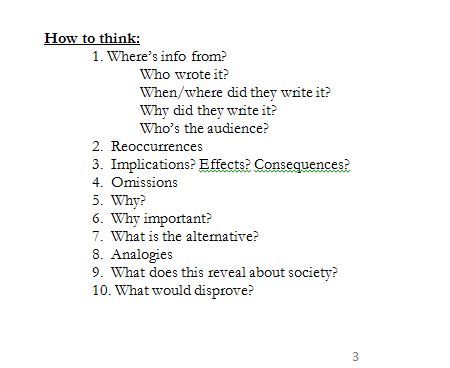
Most of the answers to these questions are fantastic points bring up in your paper if you thesis allows it and you have some good evidence to back up your points!
Good luck + I hope this helped :)
97 notes
·
View notes
Photo

it’s yo’ girl polcry here to tell all you weenies about the realities of higher education bc university isn’t all vodka jellies and hungover seminars
LAYER YOUR CLOTHES.
University seminar rooms are either trying to prepare you to be the next Captain Scott or are like the depths of Satan’s armpit. There is no in between. You will either be dying of hypothermia or sweating. Camisoles are your best friend; so are lightweight jumpers or cardigans. The necessitate the removal of clothing while still remaining publicly decent. Always have a layer in your bag; it won’t take up much space and will save you from looking like a plucked Christmas turkey. Scarves also work as a makeshift blanket.
DON’T DO ALL YOUR READING.
“But polcry!” I hear you cry, “How else am I meant to learn anything, because I’m paying nine grand a year for eight contact hours a week!”
Well (Bachelor of Arts) folks, reading is not the answer. You know why? Because a lot of it is just going to repeat itself. There’s only so much to say on seventeenth-century Anglo-American migration patterns, and you will realise that by the third 100-page article. Do the required reading, but check the introduction and conclusion of each chapter first; they sum up the gist, and the inner paragraphs fill in the nitty-gritty and unnecessary. Skim through, note down anything of importance, and don’t spend countless hours rereading the same information from eight different sources.
The recommended and optional reading is pretty much for bulking up your knowledge - use these sources when you need to write an essay or if you know a question will come up on an exam. They can lead you onto some other literature, too.
BRING EARPLUGS AND AN EYEMASK.
University halls can be very hit-and-miss, and if you’re anything like me you need a good eight and a half hours of beauty sleep. Blinds fall down (only to never return to their original position), birds are obnoxiously early risers, and flatmates have sex loud enough for you to question whether you need to check if they’re alright. You still need to sleep. Plus, earplugs are also exceptionally useful for impromptu on-campus naps; I know from experience.
PHONE YOUR DAMN MOTHER.
/ mother-figure. This woman is the one who taught you to walk and talk and pee in a toilet. Admittedly, you might regress in those abilities while shitfaced, but the woman wants to know you’re okay. Phone/Skype/Facetime at least once a week, and humour her and answer all her questions as to whether you’re eating enough vegetables and attending all your lectures and using protection. She cares. Plus you get extra child kudos which can be exchanged for food and/or laundry services on your semi-annual trips home.
YOU’LL PROBABLY CRY. A LOT.
Over a boy (or a girl), over your shitty grade in that class in which you understood nothing but spent hours trying to, over the realisation it’s two o’clock in the morning and you’re standing in your kitchen in a pizza-stained onesie eating your flatmate’s three-day-old shepherd’s pie straight from the tupperware. Crying is good; crying is necessary. Crying shows that university hasn’t sapped the humanity from within you. Let it out, let it go, and carry on with being awesome.
But if crying on the regular becomes an issue, speak to your university’s health centre about seeing a therapist. They are there to help.
YOU MIGHT NOT MAKE FRIENDS STRAIGHT AWAY.
And that’s okay. For some people, you become besties with your flatmate on the first day. For others, it takes a couple of years. Flatmates =/= friends, not necessarily. It’s okay for them to be simply people you live with. It might be that people on your course understand you better; or people in societies share hobbies and interests with you. Spread yourself into several social groups and see who sticks. Don’t invest yourself in them if they’re not willing to invest themselves in you, but be prepared to do some of the initial legwork in socialising. Coffee is always a good place to start.
DON’T GET HUNG UP ABOUT GETTING LAID.
I like sex as much as the next person, don’t get me wrong. And it may seem that everyone else is getting it on 24/7. But seriously, sex isn’t all it’s cracked up to be. While everyone is Tindering and pulling at clubs, you can take that opportunity to make memories or study or *gasp* make meaningful, lifelong bonds with people you genuinely care about.
And if you are having sex, good for you! Have as much sex as you desire. Just be safe, use the necessary contraception (including barrier methods please!!), get tested regularly (you can find your local GUM clinic here) and make sure somebody knows where you are at all times. You can have sex with whomever you please - provided it’s within your university’s code of conduct; current lecturers tend to be off limits, and for good reason bc frankly that’s kind of creepy - but be careful of your reputation. Word spreads fast, and it’s easy to be taken advantage of without realising and you could potentially end up in a situation you don’t want to be in. Be sensible.
UNIVERSITY IS NOT FOR EVERYONE.
Despite what everyone seems to think, university isn’t the right path for everyone. Whilst it’s an unavoidable necessity for some careers, a lot of industries provide progress within a company, or apprenticeships. £9000 a year is a lot to spend on something you’re not sure will get you where you want to be, or something you just don’t enjoy.
Dropping out isn’t shameful; it’s sensible. There’s nothing deplorable about admitting it’s not right for you. It’s your decision to make and your life to live.
For some, university is a fantastic experience. For some, university sucks but is a necessary evil for them to enter their dream jobs. For most, it’s somewhere in the middle. Enjoy your time there, make the most of the weird quasi-independence, and try and actually get some good grades. And bring earplugs. Trust me.
6K notes
·
View notes
Photo

some ideas for when life is chaotic :)
clean your room. this is probably the most helpful one for me- and i don’t just mean organizing everything. nope- get all that stuff out from under your bed and put it where it belongs, organize your bookshelf, dust everywhere, change your sheets, vaccum the floor, windex the windows, fold and reorganize your dresser. i do this every other week, and honestly makes me so happy when i have a friend over and they mention how tidy my room is.
clean your desk. again, don’t “clean” your desk. get rid of pens and supplies that don’t work. do you have random papers everywhere? file them. stuff that you don’t even use in your drawer? put it where it belongs. once you’re, done, wipe it off and get rid of any dust.
clean your computer/phone. get ride of unnecessary files and folders. delete downloads that are sitting there and taking up storage. update your software. get rid of apps that you aren’t using. delete photos that don’t have significance.
go on a walk. this is a good way to clear your head after a bad day, take a break from studying something really hard, or relax after finishing a long project.
get your planner back on track. usually when i’m feeling the most stressed is when assignments are do or events are scheduled. i suggest taking fifteen or twenty minutes to write down everything you can remember in your planner.
write a journal entry. even if you don’t have a journal, just grab a random notebook and write about how you’re feeling. this is a good way to release any anger or strong emotion healthily.
reconsider your commitments. you shouldn’t be overscheduling yourself every minute of every day. leave some time for some relaxation, otherwise you’ll burn out fast.
leave a day (or at least a few hours) every week for relaxation. usually this is saturday or sunday for me. try out a bath bomb, watch a new movie, bake some cookies, whatever works for you and gets your mind off things.
2K notes
·
View notes
Photo
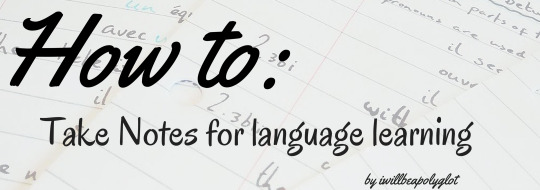
How to: take notes for language learning
For @studyvaggio - I don’t know of any masterposts related to notetaking specifically for language learning, so I thought I’d make one!
So this is a masterpost on taking and organising notes for language learning specifically. I’ll start with my method, though I’ll also be writing about a couple of other methods, since everyone has their own preferences!
The actual notes:
I make a distinction between note-taking from a textbook or website, and note taking in practice. “In practice” can mean taking notes whilst watching a movie or listening to a radio show, or actually talking to a native speaker. Regardless of the method, it ends up the same in practice: you have to take hurried notes and maybe don’t have the time or access to Google a phrase or whip out a dictionary.
Taking notes from a textbook or website means that you can organise notes fairly easily - it’s not really different than taking notes for any other subject.
Taking notes in practice can be more complicated. I find it’s best to take basic notes whilst you’re actually practicing - “word = translation”, and quick notes on fluidity of speech - “‘ne’ from ‘ne…pas’ often dropped”, “x used (not y!) in this context”. You may also want to quickly jot down any words you’d like to say, but can’t, or words/phrases to research later. Later on, restructure the notes - I usually end up with notes for different parts of my Vocab section - vocab lists, useful vocab, and fluidity of speech.
Always include genders, and note irregular verbs, stress and pronunciation for your vocab lists.
If you use two colours for your note-taking, and one colour is a soft colour (think baby pink compared to black), you can try using the dark colour for any writing in your target language, and the soft colour for the translation. I find it’s a subtle way to help get my head into my target language.
If your notes are going into a ringbinder particularly, take a different page per topic and make sure of headers and subheaders so you can easily find what you’re looking for.
Ringbinders:
I use ringbinders for pretty much everything. They’re easy to store and organise, and I can quickly reorganise everything if my needs change. The downside is that it’s easy to lose masses of paper, which is why I use this system:
I use a different ringbinder per language, and I colour code the binder somewhat to the flag of a country where it’s the official language - my Danish folder is red, my French is blue and my German is black. Obviously this isn’t necessary, I just like it this way.
I use separators in all of my ringbinders to make it easier to find what I’m looking for.
At the start of my ringbinder is a “to-study” list (normally including certain grammatical structures and some vocab that I want to learn). You could also include a list of goals for that language, IPA charts, a list of anything you’re struggling with and want to go over, a mini grammatical glossary, lists of films, music and books in your target language, and a bibliography for any websites or textbooks you use.
I have a section for grammar, which is split into further sections: Verbs (includes tenses and moods), Nouns (includes articles, and pronouns - I also include a page explaining the use of gender), Sentence Structure, Adjectives (and adverbs), and Prepositions and Conjunctions (which is mostly a page explaining what they are, and listing the most common ones). You can also include a section for Other - notes on the usage of punctuation, any major differences between your native and target languages, any useful points that don’t warrant their own section.
For vocab, I have three sections: lists of vocab on various topics, particularly useful vocab, and fluidity of speech. The vocab lists section can include anything from everyday vocab, basic vocab to highly specialised vocab. The useful vocab includes lists of: most common/useful verbs, nouns, adjectives, etc., @funwithlanguages‘s 300 words, and any words I come across that I use all the time. This last one can vary, and the easiest way to figure out the words you use a lot (or the words you want to use but don’t know) is to practice using the language with a speaker of that language. The fluidity of speech section basically includes notes on: ways to speak more naturally, pronunciation, abbreviations - basically anything that will help to make you sound like a person and not a robot.
Notebooks:
Notebooks are flexible, and as such, there’s a few different ways to use notebooks for language learning.
The everything-in-one notebook:
A single notebook used for everything to do with your target language.
Much like a bullet journal, it doesn’t necessarily mean one page per topic.
You’ll probably want to include a key - whether it’s colour coding (such as blue for grammar and red for vocab), a numbering system (1.1 etc. for grammar, 2.1 etc. for vocab) or an index, where you’ll need to number every page.
You can write all your initial notes into this, or take initial notes separately and rewrite into your notebook.
The has-more-notebooks-than-body-parts:
Multiple notebooks for different aspects of a language.
You may want to include an index in each notebook, to help you find what you’re looking for easily. Alternatively, taking a new page per topic and making use of headers can be helpful.
Notebooks include: a grammar books - for notes from a textbook, website or class, etc., several vocab books - one for vocab lists, one for the most common or useful vocab, and one for fluidity of speech, and a notebook for notes taken while practicing - although I’d recommend rewriting these notes into your other notebooks. You may want to be more specific - having a particular book for verbs and their conjugations, another for nouns, pronouns, articles, a third for adjectives and adverbs - the list goes on, really! You can also have notebooks for, say, Duolingo lessons or vocab from Memrise courses, or a notebook dedicated specifically to colloquial language. Additionally, you can have a notebook to take notes on culture, including traditions, foods, holidays, daily life and social expectations - particularly if your target language is only widely spoken in one or two countries.
Online notes
Of course, you can also take notes online, using sites such as Evernote. The benefit is that you can easily organise everything, and depending on the site you use, it syncs to your phone so you can take notes anywhere without needing to rewrite them, plus there’s normally different folders or tags so you can search for a particular set of notes without much hassle.
I hope this helps, and please let me know if you have any questions or requests!
My notetaking posts:
How to take notes (Notes series pt. 1)
How to colour code notes (Notes series pt. 2)
How to make notes pretty (Notes series pt. 3)
How to structure notes (Notes series pt. 4)
My language learning posts:
How to start studying a language
How to study multiple languages at once
How to practice with natives
How to learn a language (when you already know the basics)
Restarting a language
Learning a language at your own pace
Differentiating between two languages (when learning multiple languages)
Motivation for learning a language
Starting to learn a language
Is it possible to study multiple languages at once?
2K notes
·
View notes
Text
How to Get Good Grades and Still Have a Life
Work Smarter, Not Harder
During my last two years of my undergraduate, I came across this notion of working smarter, not harder (a.k.a. working more efficiently to maximize your grades). This is one of a few main concepts that raised my GPA by 1.0 whole point. Here are some tips that if you truly follow, you’ll see incredible results.
Stay on top of the work
Review lecture slides or textbook material before going to class
Go to class (or if online, schedule a regular time to review the material)
Complete all practice problems because chances are it’ll be on the final
Own your note taking method; either on your laptop, on lecture slides, or a notebook (and don’t think of dramatically switching it up half way through the semester)
Summarize your notes at the top or bottom with a few quick bullets on what the lecture focused on to help you organize later on
Ask questions when you are uncertain or need clarification
How Can I Work Smarter?
Go through the course syllabus for learning objectives and course description to see what areas are to be focused on
Create a daily, weekly, and monthly study plan and don’t be scared to adjust
Get enough sleep; this one is my number one tip, there’s nothing worse than hearing about people pull all-nighters before an exam (I’ve also know people who have accidentally slept through and missed it entirely)
Eat, eat, eat (and eat well); fuel your body and your brain with superfoods and plant goodness b/c everything is connected and it will pay off than eating artificial vending machine junk (trust me)
Use the 50/10 rule (50 minutes focus, 10 minute break), or whatever version you find most effective
Find your study place and rotate (i.e. use library for one course and a coffee shop for another)
Make school your 9-5pm job - the top people in my program go to the library at 9am to start their “job” and it’s so so important
Study Plan
Focus on the course(s) you try to avoid them out (and try to focus on them at the beginning of the week when you feel more motivated)
Always start study sessions with what you reviewed last time
Plan sessions in 2-3 hour blocks throughout the day and spend time studying a different course in each session (or at least one different course in-between the same course to reduce boredom)
Create practice tests and quiz yourself on material by shifting memorization to true understanding
Use summary notes to help destress before exams
Create study groups (if that’s your cup of tea) to quiz each other and explain concepts
Happy studying!
22K notes
·
View notes
